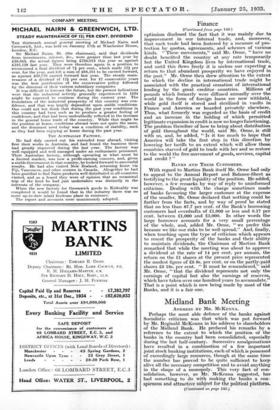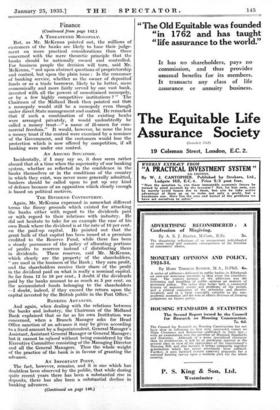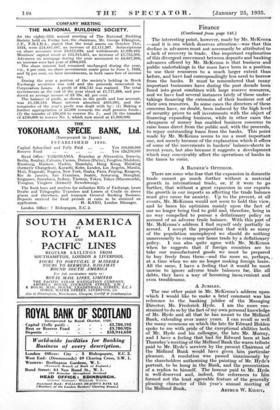Midland Bank Meeting
ADDRESS BY MR. MCKENNA.
Perhaps the most able defence of the banks against Socialistic criticism was that which was put forward by Mr. Reginald McKenna in his address to shareholders of the Midland Bank. He prefaced his remarks by a reference to the extent to which the position . of the banks in the country had been consolidated, especially during the last half-century. Successive amalgamations have resulted in a combination of a few important joint stock banking institutions, each of which is possessed of exceedingly large resources, though at the same time the number has proved to be quite sufficient to keep alive all the necessary competition and to avoid anything in the shape of a monopoly. This very fact of con- solidation, however, as Mr. McKenna suggested, has had something to do with making the banks a con- spicuous and attractive subject for the political platform.
(Continued on page 145.)
Finance
(Continued from page 142.) A THREATENED MONOPOLY.
But, as Mr. McKenna pointed out, the millions of customers of the banks are likely to base their judge- ment on more practical considerations than those concerned with the mere theoretic principle that the banks should be nationally owned and controlled. For business people the decision will turn, said Mr. McKenna, " not upon abstract questions of proprietorship and control, but upon the plain issue : Is the consumer of banking service, whether as the owner of deposited funds or as a trade borrower, likely to be better, more economically and more fairly served by one vast bank, invested with all the powers of unrestrained monopoly, or by a few highly competitive institutions ? " The Chairman of the Midland Bank then pointed out that a monopoly would still be a monopoly even though under direct State management and control. He remarked that if such a combination of the existing banks were arranged privately, it would undoubtedly be called a money trust—" a name of ill-omen for com- mercial freedom." It would, however, be none the less a money trust if the control were exercised by a nominee of the Government, and the customers would lose the protection which is now offered by competition, if all banking were under one control.
AN ABSURD SITUATION.
Incidentally, if I may say so, it does seem rather absurd that at a time when the superiority of our banking system, whether as reflected in the confidence in the banks themselves or in the conditions of the country in which they exist, was never more generally admitted, bankers should be called upon to put up any kind of defence because of an opposition which clearly enough is based on political motives.
THE DIVIDEND CONTROVERSY.
Again, Mr. McKenna expressed in somewhat different terms the flimsy grounds which existed for attacking the banks either with regard to the dividends paid or with regard to their relations with industry. He did not hesitate to take for an example the case of his own Bank where the dividend is at the rate of 16 per cent. on the paid-up capital. He pointed out that the great bulk of that capital has been issued at a premium credited to the Reserve Fund, while there has been a steady pursuance of the policy of allocating portions of profits to reserves instead cf distributing them in dividends. These reserves, said Mr. McKenna, which clearly are the property of the shareholders, " are used in the business of the Bank • they earn profit, and the shareholders receive their share of the profit in the dividend paid on what is really a nominal capital. So far from 12 to 18 per cent., I doubt. if the dividends paid by the banks amount to as much as 5 per cent. on the accumulated funds belonging to the shareholders —I doubt; indeed, if they exceed the return upon the capital invested by the British public in the Post Office."
BANKING ADVANCES.
And again, when dealing with the relations between the banks and industry, the Chairman of the Midland Bank explained that so far as his own Institution was concerned, when a Branch Manager asks for Head Office sanction of an advance it May be giVen according to a fixed amount by a Sulierintendent, General Manager's Assistant, Assistant General Manager or General Manager; but it cannot be refused without being considered by the Execuiive Committee consisting of the Managing. Director and all the General Managers. Thus the whole weight of the practice of the bank is in favour of granting the advance.
AN IMPORTANT POINT.
The fact, however, remains, and it is one which has doubtless been observed by the public, that while during quite recent years there has been a substantial rise in deposits, there has also been a substantial decline in banking advances.
(Continued on page 146.)
Finance
(Continued from page 145.) The interesting point, however, made by Mr. McKenna —and it is one which deserves attention—was that this decline in advances must not necessarily be attributed to a lack of recovery in trade. One important explanation of this divergent movement between deposits and banking advances offered by Mr. McKenna is that business and public undertakings in the mass have been in a position to use their resources to a much • larger extent than ,before, and have had correspondingly less need to borrow from the banks. It must be remembered that many important businesses have during the past decade been fused into great combines with large reserve resources, and we have had several instances lately of these under- takings financing the extension of their business out of their own resources. In some cases the directors of these concerns have, no doubt, been induced by the high level of security prices to sell investments with the object of financing expanding business, while in other cases the cheapness of money has enabled business concerns to raise loans direct from the public and, with the proceeds, to repay outstanding loans from the banks. This point made by Mr. McKenna seems to me a most important one, not merely because of the explanation which it offers of some of the movements in bankers' balance-sheets in recent years, but also because it suggests a development- which may conceivably affect the operations of banks in the times to collie.
A BANKER'S OPTIMISM.
There are some who fear that the expansion in domestic trade cannot go much further without a material growth in international trade, or, if it were -to go further, that without a great expansion in our exports the growth in our imports as affecting the trade balance must give cause for anxiety. Up to the present, at all events, Mr. McKenna would not seem to hold this view, and he bases his optimism mainly upon the fact of our no longer being tied to gold and, therefore, being in no way compelled to pursue a deflationary policy on account of an adverse trade balance. With this part of Mr. McKenna's address I find myself only partially in accord. I accept the proposition that with so many of the population unemployed we should do nothing unnecessarily to cramp, our home trade by a deflationary policy. I can also quite agree with Mr. McKenna when, he suggests that if foreign countries are to take our manufactured goods we must be prepared to buy freely from them—and the more so, perhaps, at a time when we are no longer making foreign loans. All the same, I have a feeling that it would be most unwise to ignore adverse trade ,balances for, like all debts, they have a way of becoming incoLvenient and even troublesome.
A JUBILEE.
The one other point in Mr. McKenna's address upon which I -would -like to make a brief comment was his reference to the , banking jubilee of the Managing Director; Mr; Frederick Hyde. I, am the more con- strained to do so by the fact of my own personal knowledge of Mr. Hyde and all that he has meant to the Midland Bank, extending over many years. I can recall so *ell the many occasions on which the late, Sir Edward Holden spoke to me with pride of the exceptional abilities both of Mr. Hyde and his colleague, the late Mr. Murray, and I have a feeling that had Sir Edward been at last Thursday's meeting of the Midland Bankthe warm tribute paid to Mr. Hyde's services by the present Chairman of the Midland Bank would have given him particular pleasure. A resolution was passed -Unanimously by the shareholders authorizing the painting of Mr.' Hyde's portrait, to be hung in the Bank, and the presentation of a replica to himself. The honour paid to Mr. Hyde is well-deserved and, indeed, the references to him formed not the least agreeable feature of the generally pleasing character of this year's annual meeting of
















































 Previous page
Previous page